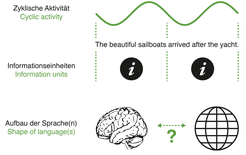Max Planck Research Group Language Cycles
Language Cycles Lab
Language comprehension is mostly effortless. But difficulty may arise when speakers speak too fast or too slowly, talk a blue streak — or serve too much information in too little time. While we may be flexible, our comprehension abilities are still limited.
The group “Language Cycles” searches for those properties of the human brain that limit our verbal processing abilities: Does our preferred speed of talking depend on the brain’s pace of processing? How much information can we process within a given time window—how long are the time windows that our brain uses for language processing? Are maybe the language-processing time windows of the brain the reason that all languages of the world pack information into units of fitting sizes (e.g., words, phrases, and sentences)?

Our research combines methods from cognitive neuroscience (e.g., electro– and magnetoencephalography) and linguistics. Neuroscientific methodology enables us to characterize the electrophysiological time windows that determine the pace of linguistic information processing. The use of linguistic methodology enables us to quantify the size of information units in the languages of the world. In combination, our research has the potential to explain the shape of human language by the processing cycles of the human brain—the language cycles.
